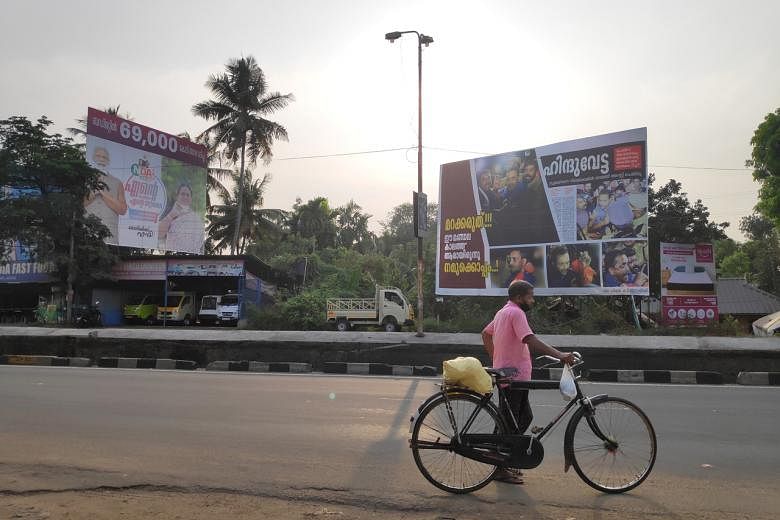PATHANAMTHITTA, KERALA - Mr Krishnan Pillai leapt off the motorbike he had parked absently beside a wall adorned with the painting of a saffron lotus, the symbol of India's ruling Bharatiya Janata Party (BJP).
"Don't show me as a BJP supporter! My friends will laugh at me," he shouted at a news photographer in the town of Alleppey.
"A Malayali choosing BJP is like (north Indian state) Uttar Pradesh choosing (Tamil Nadu party) DMK," the 29-year-old added. His point was that the BJP is as alien to a speaker of Malayalam, the language of Kerala, as the DMK, a party built on a southern Dravidian identity, would be to a voter in the north of India.
Prime Minister Narendra Modi's BJP is in power at the centre and in 17 of India's 28 states, but in Kerala, the party has struggled to get its foot in the door. Now this time, in the state election on April 6, it just might.
Kerala has a bipolar polity that has voted the communist-led or Congress-led alliances into the state assembly by turn for decades.
Riding on global appreciation for initially curtailing Covid-19 and popularity at home for the ration kits distributed during the pandemic, the ruling communist alliance under chief minister Pinarayi Vijayan is hoping for an atypical re-election.
Unlike in the rest of the country, where they are natural allies, the communists and the Congress are bitter rivals in this southern state. Congress vice-president Rahul Gandhi, who is the parliamentarian from Wayanad constituency in Kerala, has been touring the state, promising universal basic income and secular governance, and accusing Mr Pinarayi of nepotism and corruption.
Meanwhile, the BJP is pitching itself as "a genuine third alternative", said Mr K. Surendran, one of its few well-known candidates. Another is the nationally revered engineer, Mr E. Sreedharan, the man behind the Delhi Metro and other MRT-like rail systems in Indian cities. He is being projected as the party's chief ministerial face.
The BJP won its first seat in the Kerala assembly only in 2016. Its vote share grew that year from 6.4 per cent in 2009 to 14.9 per cent. It also took a chunk of votes from the Congress in the 2019 parliamentary elections, although not enough to win any seats.
The BJP's only legislator in Kerala, Mr O. Rajagopal, was candid when asked why the party wasn't finding a footing here.
"Kerala has a literacy rate of 90 per cent. They are thinking, they are argumentative. These are habits of educated people," he told the Indian Express.
To this, Mr Shashi Tharoor, Congress parliamentarian from Thiruvananthapuram, Kerala's capital, said the leader had "let the cat out of the bag".
"An authoritative BJP source admits that Keralites don't vote for the BJP because they are educated & can think!!" he tweeted.
In a state with progressive beliefs and large, politically influential non-Hindu populations - 27 per cent Muslim and 19 per cent Christian - the Hindu-nationalist party tried to appeal to conservative Hindus by opposing the Indian Supreme Court's historic 2018 verdict to allow young women pilgrims into Sabarimala's Ayyappan temple.
For months that year, Hindu protesters thronged entrances to the hill shrine and beat back women pilgrims. When the ruling communist-led Kerala government offered police protection to women devotees, the BJP decried it as "an attack on Hindus".
Across Kerala today, Hindu groups have displayed blown-up photos of BJP state president Surendran's tussle with policemen at Sabarimala. "Never forget who stood up for Hindus!" it says in enormous yellow Malayalam letters.
"Both the Congress and the BJP converted a feminist issue into a religious one," said Ms Veena George, a communist legislator from Aranmula in Pathanamthitta district that was the epicentre of the Sabarimala protests. Campaigning for re-election in the same constituency, Ms George said she respected people's faith, but "would rather speak of rainwater harvesting, roads, food security and housing".
Interestingly, even Pathanamthitta locals who appreciated the BJP's role in blocking women's temple entry, preferred that their politicians speak of socioeconomic issues.
"Two floods, the protests, then coronavirus has killed our income and peace of mind. I am a devoted Hindu, and I will never let my wife go to Sabarimala, but from the government, I want a livelihood, pension, and affordable education for my daughters," said Mr Sreejith J., 38, who lost his accounting job during the pandemic.
Trying to balance the party's core concerns and voters' priorities, the BJP manifesto thus promises a new law for Sabarimala, another banning forced religious conversion through inter-religious marriage, at least one job per family, land to marginalised tribes and Dalits (former "untouchables" in India's caste system), and free laptops for high schoolers.
It has conspicuously overlooked banning cow slaughter in the state that loves its beef fry. The party's leaders are also courting church representatives, with BJP spokesman B. Gopalakrishnan saying that some Orthodox Christian groups "indicated their support" but still had "some misgivings".
The party has also hedged its bets by falling back on Mr Modi. Tall hoardings feature the bearded prime minister advertising national government schemes like subsidised cooking gas and housing.


